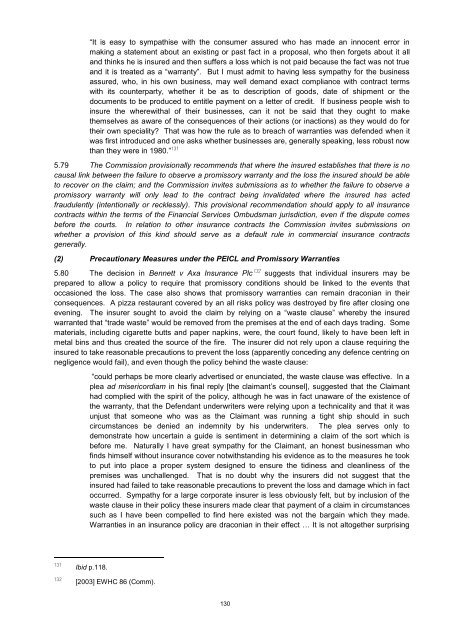Insurance Contracts CP - Law Reform Commission
Insurance Contracts CP - Law Reform Commission
Insurance Contracts CP - Law Reform Commission
You also want an ePaper? Increase the reach of your titles
YUMPU automatically turns print PDFs into web optimized ePapers that Google loves.
―It is easy to sympathise with the consumer assured who has made an innocent error in<br />
making a statement about an existing or past fact in a proposal, who then forgets about it all<br />
and thinks he is insured and then suffers a loss which is not paid because the fact was not true<br />
and it is treated as a ―warranty‖. But I must admit to having less sympathy for the business<br />
assured, who, in his own business, may well demand exact compliance with contract terms<br />
with its counterparty, whether it be as to description of goods, date of shipment or the<br />
documents to be produced to entitle payment on a letter of credit. If business people wish to<br />
insure the wherewithal of their businesses, can it not be said that they ought to make<br />
themselves as aware of the consequences of their actions (or inactions) as they would do for<br />
their own speciality? That was how the rule as to breach of warranties was defended when it<br />
was first introduced and one asks whether businesses are, generally speaking, less robust now<br />
than they were in 1980.‖ 131<br />
5.79 The <strong>Commission</strong> provisionally recommends that where the insured establishes that there is no<br />
causal link between the failure to observe a promissory warranty and the loss the insured should be able<br />
to recover on the claim; and the <strong>Commission</strong> invites submissions as to whether the failure to observe a<br />
promissory warranty will only lead to the contract being invalidated where the insured has acted<br />
fraudulently (intentionally or recklessly). This provisional recommendation should apply to all insurance<br />
contracts within the terms of the Financial Services Ombudsman jurisdiction, even if the dispute comes<br />
before the courts. In relation to other insurance contracts the <strong>Commission</strong> invites submissions on<br />
whether a provision of this kind should serve as a default rule in commercial insurance contracts<br />
generally.<br />
(2) Precautionary Measures under the PEICL and Promissory Warranties<br />
5.80 The decision in Bennett v Axa <strong>Insurance</strong> Plc 132 suggests that individual insurers may be<br />
prepared to allow a policy to require that promissory conditions should be linked to the events that<br />
occasioned the loss. The case also shows that promissory warranties can remain draconian in their<br />
consequences. A pizza restaurant covered by an all risks policy was destroyed by fire after closing one<br />
evening. The insurer sought to avoid the claim by relying on a ―waste clause‖ whereby the insured<br />
warranted that ―trade waste‖ would be removed from the premises at the end of each days trading. Some<br />
materials, including cigarette butts and paper napkins, were, the court found, likely to have been left in<br />
metal bins and thus created the source of the fire. The insurer did not rely upon a clause requiring the<br />
insured to take reasonable precautions to prevent the loss (apparently conceding any defence centring on<br />
negligence would fail), and even though the policy behind the waste clause:<br />
―could perhaps be more clearly advertised or enunciated, the waste clause was effective. In a<br />
plea ad misericordiam in his final reply [the claimant‘s counsel], suggested that the Claimant<br />
had complied with the spirit of the policy, although he was in fact unaware of the existence of<br />
the warranty, that the Defendant underwriters were relying upon a technicality and that it was<br />
unjust that someone who was as the Claimant was running a tight ship should in such<br />
circumstances be denied an indemnity by his underwriters. The plea serves only to<br />
demonstrate how uncertain a guide is sentiment in determining a claim of the sort which is<br />
before me. Naturally I have great sympathy for the Claimant, an honest businessman who<br />
finds himself without insurance cover notwithstanding his evidence as to the measures he took<br />
to put into place a proper system designed to ensure the tidiness and cleanliness of the<br />
premises was unchallenged. That is no doubt why the insurers did not suggest that the<br />
insured had failed to take reasonable precautions to prevent the loss and damage which in fact<br />
occurred. Sympathy for a large corporate insurer is less obviously felt, but by inclusion of the<br />
waste clause in their policy these insurers made clear that payment of a claim in circumstances<br />
such as I have been compelled to find here existed was not the bargain which they made.<br />
Warranties in an insurance policy are draconian in their effect … It is not altogether surprising<br />
131<br />
132<br />
Ibid p.118.<br />
[2003] EWHC 86 (Comm).<br />
130

















